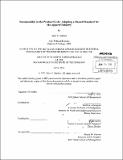Sustainability in the product cycle : adopting a shared standard for the apparel industry
Author(s)
Hartley, Alice C. (Alice Catherine)
DownloadFull printable version (6.097Mb)
Other Contributors
Sloan School of Management.
Advisor
Matthew Amengual.
Terms of use
Metadata
Show full item recordAbstract
Decisions made by product designers strongly influence the social and environmental impacts that a consumer product will have over its lifetime. This study examines the Sustainable Apparel Index, a decision-support tool that aims to clarify environmental trade-offs and reduce overall product impacts within the apparel industry. As an example of the broad potential for shared industry standards, the Apparel Index is compared to other, company-specific apparel tools, which exist to integrate environmental knowledge into the product creation process. Based on this comparative analysis as well as primary research within the industry, the thesis draws the following conclusions: 1) There are ways to make tools more user-friendly for designers, by paying attention to collaboration types and decision-making systems. 2) It is important to maintain existing workflow; embedding intelligence into tools and processes can help. 3) Efforts to share resources should focus on certain elements of knowledge and decision-making systems, where sharing will add the most value. 4) There is a key trade-off between speed and transparency, so shared tools should allow for flexibility according to user preferences. The study concludes with three recommendations for ways to improve the Sustainable Apparel Index, increasing its utility for product designers. In addition to suggesting improvements to future versions of the Apparel Index, the findings described here are relevant to other consumer goods industries such as electronics, toys, and furniture, which feature supply chains of a similar global scope.
Description
Thesis (M.B.A.)--Massachusetts Institute of Technology, Sloan School of Management, 2012. Cataloged from PDF version of thesis. Includes bibliographical references (p. 67-69).
Date issued
2012Department
Sloan School of ManagementPublisher
Massachusetts Institute of Technology
Keywords
Sloan School of Management.